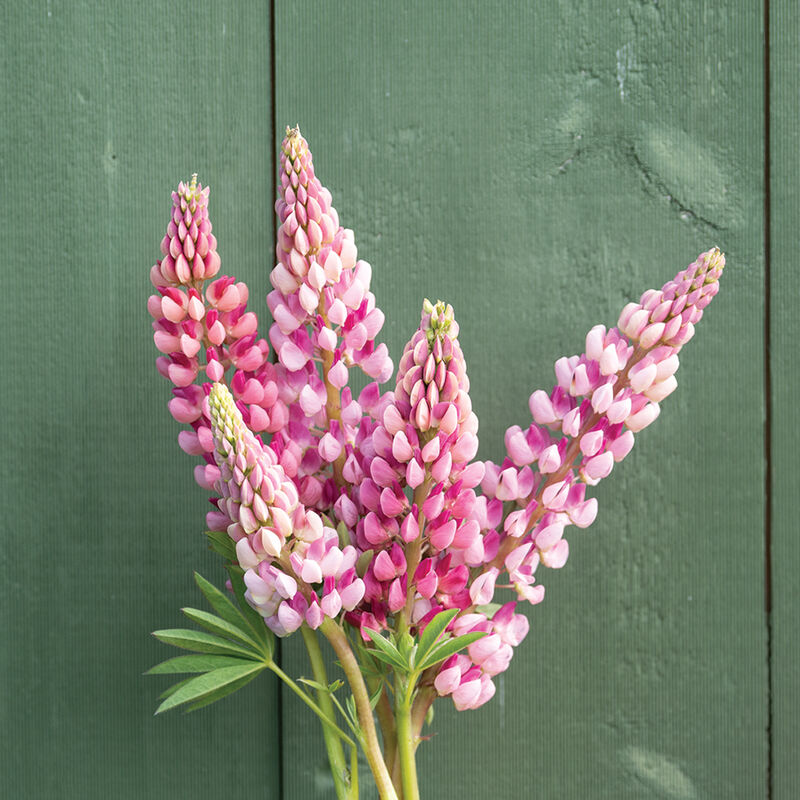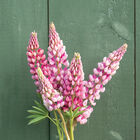Chatelaine Lupine Seed
Chatelaine Lupine Seed
Hardy, long-lived, and easy to maintain perennial.
Part of the Russell Hybrids 'Band of Nobles' series. Chatelaine has sweetly scented bicolor blooms in shades of pink with white. Plants produce multiple blooms with stiff, straight stems. In our trials, these first-year flowering plants bloomed in early July in the first year and about a month earlier (early June) from well-established plants in the second season of growing. Bloom quality and productivity were better in the second season, although all plants did produce flowers in the first season. Performs best where summers are cool. Attracts and provides a food source for bees and hummingbirds. 1–2' blooms/spikes are densely covered with ½" pea-like flowers. Lupine is typically resistant to deer and rabbits. Perennial in Zones 4–8.Specs:
- This product does not ship to the following countries: United Arab Emirates, Austria, Australia, Barbados, Belgium, Bulgaria, Bermuda, Bahamas, Switzerland, Cyprus, Czech Republic, Germany, Denmark, Estonia, Spain, Finland, France, United Kingdom, Greece, Hong Kong, Croatia, Hungary, Ireland, Iceland, Italy, Japan, Republic of Korea, Kuwait, Cayman Islands, Lithuania, Luxembourg, Latvia, Malta, Netherlands, Norway, New Zealand, Oman, Poland, Portugal, Qatar, Romania, Saudi Arabia, Sweden, Singapore, Slovenia, Slovakia, San Marino, Thailand, Trinidad and Tobago, Taiwan, Ukraine.
DAYS TO GERMINATION:
14-21 days at 65-75°F (18-24°C). To promote germination, soak seeds overnight or scarify seeds.SOWING:
Transplant - Sow 4-8 weeks before planting out. Seedlings can tolerate a light frost. Deep cell trays like 50-cell Deep or a 32-cell will support healthy seedling and taproot development. Shallower cell trays like a 50-cell or 72-cell may also be used so long as transplanting is not delayed. Lupine seedlings and roots need space to grow and expand and once restricted will produce inferior plants and flowers. Thin to one plant per cell/container when first true leaves appear. Harden off and transplant out. Direct seed - Cover seeds with 1/4" soil or growing media as darkness aids gemination.LIGHT PREFERENCE:
Sun/Part Shade.PLANT HEIGHT:
24-40".PLANT SPACING:
18-24".HARDINESS ZONES:
Zones 4-8.HARVEST:
80% of blooms on spike are open.SOIL REQUIREMENTS:
Moist, well drained. A pH of 5.5-7 is acceptable, but a slightly acidic soil is preferred.USES:
Cut flower. Borders, masses, cottage gardens, or wildflower meadows.CAUTION: All parts of this flowering plant are poisonous, including seeds. Exercise extreme caution around children and pets.SCIENTIFIC NAME:
Lupinus spp.Johnny's is committed to your success, every step of the way.
We want you, our customer, to be 100% satisfied with all of our seeds, tools, and supplies.
If anything you purchase from us proves unsatisfactory, we will either replace the item or refund the purchase price.











